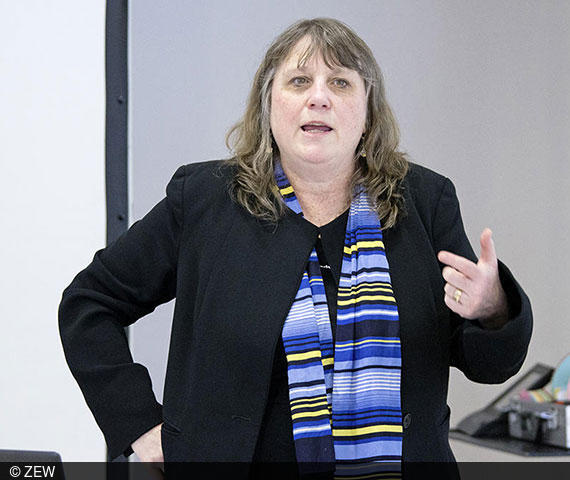Project Partners Discuss Ubiquitous Working at Interdisciplinary Closing Conference at ZEW
ConferencesHow are our lives being transformed by flexible working conditions? What effect is ubiquitous working having on our well-being? And how can we strike a healthy work-life balance? These are some of the questions that ZEW has been investigating as part of a project on "Ubiquitous Working" carried out in cooperation with the Leibniz Research Centre for Working Environment and Human Factors (IfADO) and the Leibniz-Institut für Wissensmedien (IWM). On 23 and 24 March 2017 around 40 participants from a range of disciplines from business studies, economics and computing to psychology and sociology attended the project's interdisciplinary closing conference in Mannheim to discuss the more flexible ways of working which have been made possible thanks to digital technology.
Ellen Ernst Kossek, Professor of Management at Purdue University in Indiana, USA, delivered the keynote address in which she provided an overview of the multitude of ways employees can now work more flexibly. She made sure to point out, however, that not all kinds of flexibility in the workplace necessarily give employees more freedom to organise their time as they please. Furthermore, according to Kossek, measures intended to create a healthier work-life balance vary greatly depending on the sector and occupation. The challenges faced by retailers, for example, are very different from those faced by IT firms. However, there are some things that are common to any successful implementation of flexible working practices regardless of sector or occupation. Solutions must respond to the specific local needs of all those involved. This is most successfully achieved through an open dialogue between management and staff in which consideration is made for the other side's point of view. As evidence of this, Kossek presented the results from a number of field experiments in companies in the IT and retail sectors.
Blurring the line between work and home life not always a source of stress
The other keynote speaker at the event, Sabine Sonnentag, Professor of Work and Organizational Psychology at the University of Mannheim, discussed the effect of work-related ICT use (including phones, smartphones, and laptops) during leisure time. According to Sonnentag, though employees are less able to relax after work when they engage in work-related communication in their free time, the negative repercussions of this on their general well-being are relatively limited. At least some employees probably see the option of working outside of regular business hours as a means to help them better manage their work-life balance and therefore do not perceive this as source of stress. Sonnentag backed this assumption up with the results of a recent pilot study which is to be continued in the near future.
Leibniz research project "Ubiquitous Working: Challenges and Prospects of the Interconnected Working Environment"
The Leibniz research project "Ubiquitous Working: Challenges and Prospects of the Interconnected Working Environment" is run by ZEW, IfADO and IWM. Until the end of June 2017, researchers from these institutes will continue to investigate the many new, flexible ways of working beyond the office walls and outside of regular business hours that have been made considerably easier thanks to new digital technologies such as smartphones, mobile Internet and laptops. The core of the project consists of an interdisciplinary investigation of the opportunities and risks that come with ubiquitous working. With this in mind, the project's closing conference included a discussion of the effects of flexible working practices such as trust-based working hours and working from home on gender differences in the labour market. Further up-to-the-minute topics discussed included the blurring of the boundaries between work and home life as well as digital labour markets such as crowdsourcing.
